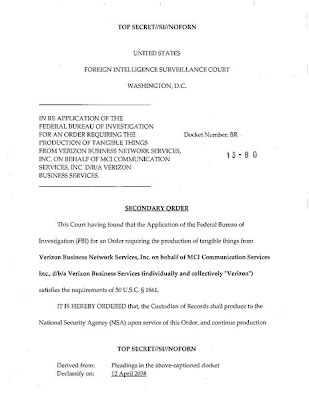In the recent leaks coming out of the National Security Agency (NSA),
it has been publicly proven that all phone and Internet records in the
world are being recorded and analyse This leak has brought up new
concerns of what is considered reasonable government spying, and where
should the line be drawn. Professor Vinsel has suggested using a
National Terms of Service (NTOS). The NTOS would be like any
other terms of service, it would describe the user's, and the operator's
rights. Some sections it could include are, reasonable expectations of
privacy, how your data would be used, and maybe even rights that the
user retains.
The main reason a NTOS is not needed is because its text would be
redundant. The terms of the NTOS can already be derived from laws such
as the Constitution of the United States. Specifically, the Fourth
Amendment, which protects against unreasonable searches and seizures. It
reads,
The NTOS is also not necessary because what occurs between a user and a server is not the concern of the government. When using an encryption tool such as transport layer security (TLS), it cannot be seen what is happening. So email, web traffic, VOIP phone calls, and instant messages all look alike. There are ways to somewhat accurately determine what kind of traffic it is, but that would require more data, mainly the metadata. Which according to the government does not constitute data, but when torrenting sites try to use metadata the government gets very upset.
With staggering number of laws that already exist in the United States, it is time that we cut back on new laws, and use what we have. Time and time again it is shown that the fourth amendment is adequate for the protection of data passing over the Internet. The NSA has been arguing that it is constitutional to record all the traffic, but not read it. Following the logic of courts, it should be legal to download copyrighted movies, but the act of watching them would be illegal.
A NTOS would be redundant, and would only further complicate the complicated legal system. It would be in the publics best interest to follow laws as they are already written, and not to exclude certain government agencies. And as with other forms of communication, what happens should be up to the user and the operator of the Internet service that is being used.
Image credit: https://en.wikipedia.org/wiki/File:Verizon.pdf
 |
| Court order requesting all of Verizon's customer's calling records |
The right of the people to be secure in their persons, houses, papers, and effects, against unreasonable searches and seizures, shall not be violated, and no Warrants shall issue, but upon probable cause, supported by Oath or affirmation, and particularly describing the place to be searched, and the persons or things to be seized.
This section clearly states that the federal government cannot search without a warrant and probable cause. In my opinion, there is no way that all the millions of Verizon's customers were under probable cause for a full three months. It can be seen that this section of the Constitution already covers one section of what a NTOS would talk about. The federal government should not be collecting any data, unless it specifically target, and within a specific date range. Those requirements already fall in line with current laws. Unlike popular opinion, the Internet and its communications do not take place in a virtual world that is discrete from the physical world.
The NTOS is also not necessary because what occurs between a user and a server is not the concern of the government. When using an encryption tool such as transport layer security (TLS), it cannot be seen what is happening. So email, web traffic, VOIP phone calls, and instant messages all look alike. There are ways to somewhat accurately determine what kind of traffic it is, but that would require more data, mainly the metadata. Which according to the government does not constitute data, but when torrenting sites try to use metadata the government gets very upset.
With staggering number of laws that already exist in the United States, it is time that we cut back on new laws, and use what we have. Time and time again it is shown that the fourth amendment is adequate for the protection of data passing over the Internet. The NSA has been arguing that it is constitutional to record all the traffic, but not read it. Following the logic of courts, it should be legal to download copyrighted movies, but the act of watching them would be illegal.
A NTOS would be redundant, and would only further complicate the complicated legal system. It would be in the publics best interest to follow laws as they are already written, and not to exclude certain government agencies. And as with other forms of communication, what happens should be up to the user and the operator of the Internet service that is being used.
Image credit: https://en.wikipedia.org/wiki/File:Verizon.pdf
No comments:
Post a Comment